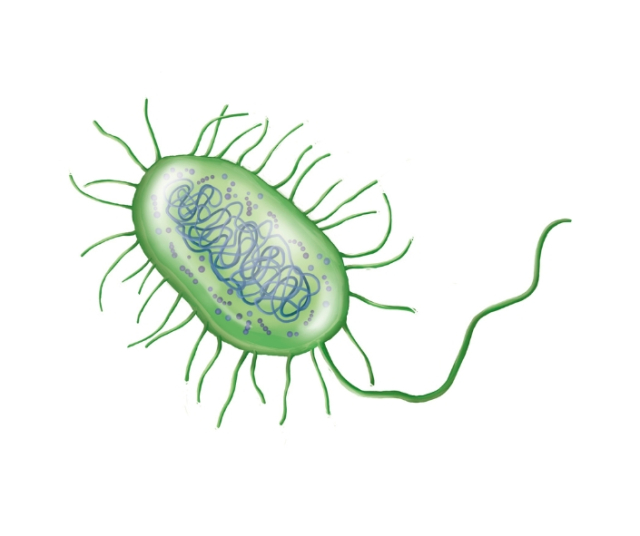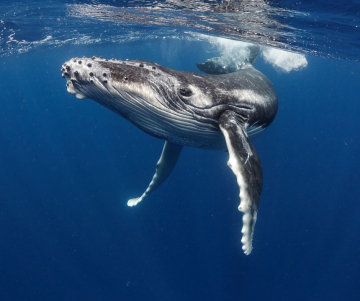What is the Monera Kingdom? | Features, groups and challenges

In the vast tree of life that has flourished on our planet over millions of years, the Monera Kingdom occupies a place of particular importance. It is the kingdom of the simplest and oldest organisms, the pioneers of life as we know it.
You might be interested in: What are the kingdoms of nature?
What is the Monera Kingdom?
Kingdom Monera is one of the five kingdoms of traditional biological classification, along with Protista, Fungi, Plantae and Animalia. However, it is important to note that taxonomy has evolved, and today classification into three domains is preferred: Bacteria, Archaea and Eukarya. The first two correspond mainly to the ancient Monera Kingdom, while Eukarya encompasses the other four kingdoms.
Organisms of the Monera Kingdom are the simplest in terms of cellular structure. They are unicellular and prokaryotic, which means that they lack a defined nucleus and internal membranous organelles. Instead, its genetic material floats freely in the cytoplasm. This structural simplicity does not, however, prevent them from being a powerful force in Earth's ecosystems.
Diversity in the Monera Kingdom
Despite its structural simplicity, the Monera Kingdom is home to an incredible diversity of life forms. It is traditionally divided into two main groups: bacteria and archaea.
Bacteria:
Bacteria are the most abundant and diverse organisms on Earth. They are found in almost all environments, from the abyssal depths of the ocean to the most arid deserts and frozen poles. They have varied shapes and sizes, and can be spherical (cocci), elongated (bacilli) or spiral-shaped (spirochetes). Some bacteria are photosynthetic, while others are chemosynthetic or heterotrophic.
Archaea:
Archaea, often called "ancient bacteria" due to their evolutionary age, are Extremophilic organisms found in extreme environments such as hot springs, deep-ocean hydrothermal vents, and hypersaline salt pans. Although they share superficial similarities with bacteria, archaea are genetically more related to eukaryotes than to bacteria.
Importance of the Monera Kingdom
Despite their apparent simplicity, organisms from the Monera Kingdom play a crucial role in terrestrial and aquatic ecosystems. Its importance extends to several aspects of life on Earth:
Biogeochemical cycles:
Bacteria play critical roles in the decomposition of organic matter, nitrogen fixation, and the carbon cycle. Without these microorganisms, nutrients essential to life would not be available in forms usable by other organisms.
Symbiosis:
Many bacteria and archaea maintain symbiotic relationships with other organisms, from digestion in animals to nitrogen fixation in plant roots. These symbiotic associations are essential for the health and functioning of many ecosystems.
Industry and Biotechnology:
Bacteria and archaea are used in a wide range of industrial and biotechnological applications, ranging from the production of fermented foods to the synthesis of pharmaceuticals and the bioremediation of environmental contaminants.
Study Models:
Due to their rapid growth and short life cycle, bacteria and archaea are ideal model organisms for studying fundamental biological processes, such as DNA replication, gene transcription, and regulation of metabolism.
The Role of Bacteria in the History of Life
Since their appearance more than 3.5 billion years ago, bacteria have been key players in the history of life on Earth. Their ability to adapt to a wide variety of environmental conditions has been instrumental in shaping ecosystems and allowing the evolution of more complex life forms. Some important milestones in the evolutionary history of bacteria include:
Photosynthesis and Oxygen:
About 2.5 billion years ago, cyanobacteria (also known as blue-green algae) were the first organisms to perform oxygenic photosynthesis, releasing oxygen as a byproduct. This event, known as the Great Oxidation, changed the Earth's atmospheric composition and allowed the evolution of aerobic organisms.
Endosymbiosis:
Mitochondria, organelles present in eukaryotic cells, are believed to have bacterial origin. The endosymbiosis theory proposes that mitochondria evolved from a symbiotic association between an ancestral eukaryotic cell and an aerobic bacteria.
Mass Extinctions:
Bacteria have survived multiple mass extinction events throughout Earth's history, adapting to extreme environmental conditions and colonizing new habitats. Their ability to withstand adverse conditions has contributed to their longevity as a dominant group in the biosphere.
The Future of the Monera Kingdom
As our understanding of microbiology advances, new species of bacteria and archaea are being discovered in a variety of environments, from the deepest oceans to the most fertile soils. These discoveries are transforming our understanding of microbial diversity and their role in global ecosystems.
However, we also face new challenges related to antimicrobial resistance, biodiversity loss and climate change, which could have a significant impact on the diversity and functioning of microorganisms in the Monera Kingdom. It is essential that we recognize the importance of these organisms and work to conserve their diversity and function in global ecosystems.
Antimicrobial Resistance:
One of the biggest challenges we face today is the increasing resistance of bacteria to antibiotics and other antimicrobial agents. The excessive and inappropriate use of antibiotics in human medicine, agriculture and animal husbandry has led to the development of resistant bacterial strains that represent a serious threat to public health. Combating antimicrobial resistance requires a comprehensive approach that includes surveillance, regulation of antimicrobial use, and development of new treatments.
Biodiversity loss:
Despite their fundamental importance, many species of bacteria and archaea are endangered due to the loss and degradation of their natural habitats. Deforestation, urbanization, pollution and climate change are reducing microbial diversity around the world, which could have unpredictable consequences for ecosystems and human health. It is crucial that we take action to protect and restore the natural habitats where these organisms live.
Climate change:
Climate change is altering weather patterns around the world, which could have profound effects on the distribution and activity of microorganisms in the Monera Kingdom. For example, rising temperatures could encourage the growth of pathogenic bacteria in certain regions, increasing the risk of infectious diseases. Additionally, changes in precipitation patterns could alter nutrient availability and carbon cycling in aquatic and terrestrial ecosystems. Addressing climate change is essential to preserving the diversity and functioning of microorganisms around the world.
Research and Education:
To address these challenges, it is essential to invest in scientific research and education in microbiology and biotechnology. We need to better understand microbial diversity, its functions and interactions in natural ecosystems, as well as develop new technologies and approaches to conserve and sustainably use microbial resources.
Global Collaboration:
Finally, addressing the challenges related to the Monera Kingdom requires global collaboration between governments, academic institutions, industry, non-governmental organizations and civil society. We must work together to develop effective policies and strategies to conserve microbial diversity, mitigate the effects of climate change, and combat antimicrobial resistance.
As we face new challenges related to antimicrobial resistance, biodiversity loss and climate change, it is essential that we recognize the importance of these organisms and take steps to conserve their diversity and function in natural ecosystems.
ARTICLES

Economist's Day in Colombia
Every July 3, Colombia celebrates Economist's Day, a special moment to recognize and value the fundamental role that these professionals play.

What is cold brew and how to prepare it?
Coffee is more than just a drink for many of us. Cold brew coffee, known for its smoothness, concentrated flavor and refreshing profile.

How to Prepare a Homemade Pizza
Pizza, with its delicious ingredients, crispy dough and melted cheese, is one of the most popular dishes in the world.

Whale watching in Colombia
The Colombian Pacific is a treasure that houses a wealth of marine biodiversity. Among its most notable wonders are the majestic whales

History and challenges of broadcasters
Broadcasters, in particular, have played a crucial role in the dissemination of information, entertainment and culture through the media.

Public Servant Day in Colombia
. In Colombia, Public Servant Day is a special occasion to honor those who dedicate their efforts to managing collective well-being.
Suscribete a nuestro Boletín